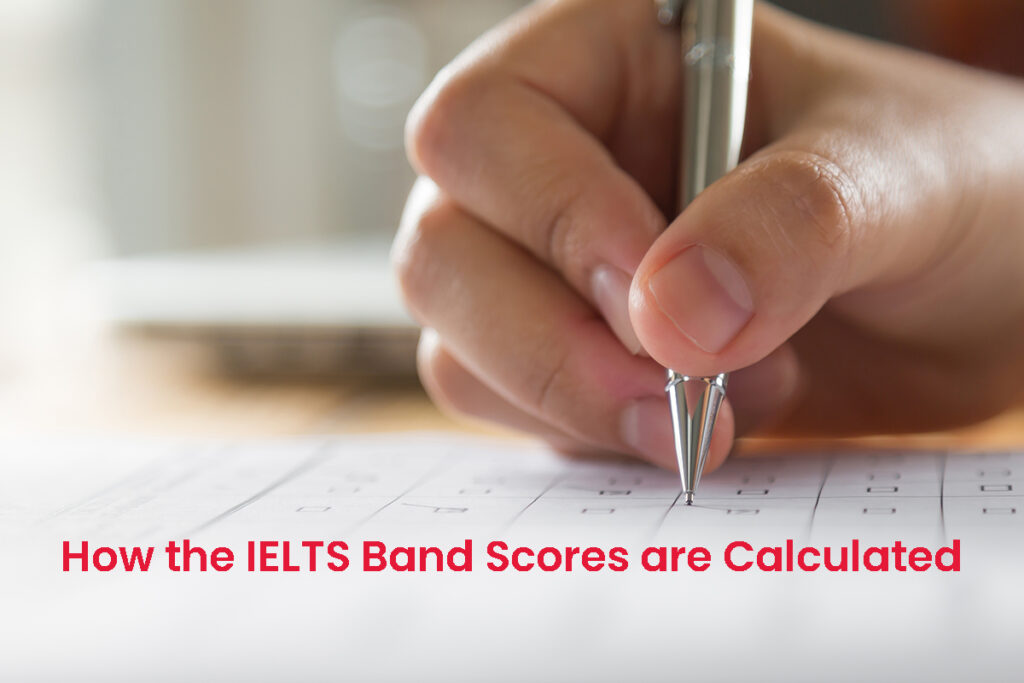The IELTS band score chart and IELTS band score table below provide a clear breakdown to help you understand your IELTS score and calculate it accurately. Knowing how to interpret the IELTS band score is essential if you want to achieve success and meet the requirements for your desired IELTS score.

All IELTS band scores range from 0 to 9, including half scores like 6.5 or 7.5. You will receive an individual IELTS band score for each skill such as listening, reading, writing, and speaking as well as an overall band score. The IELTS overall band calculator works by averaging these four skills to determine your final IELTS score. Check the IELTS band score chart below for a clearer understanding.
IELTS scores range from 0 to 9, and you can also receive half band scores such as 6.5 or 7.5. Each skill—listening, reading, writing, and speaking—is assigned an individual IELTS band score, and these are averaged to calculate your overall band score. Refer to the IELTS band score table below for an example of how this works.
Your IELTS overall band score is the average of the four individual skills: listening, reading, writing, and speaking.
The final IELTS band score is rounded to the nearest whole or half band, as per the official IELTS band score chart.
If your average IELTS score is:
The table below outlines the English proficiency levels for IELTS band scores ranging from 5 to 9.

Your IELTS listening band score and IELTS reading band score are based on the total number of correct answers out of 40 questions. There are no penalties for incorrect answers, so it’s beneficial to attempt all questions.
Note: The IELTS listening score is calculated the same way for both Academic and General Training (GT) test-takers. Everyone takes the same listening test with identical marking criteria, as reflected in the IELTS band score table.

The IELTS band score for both Writing Task 1 and Task 2 is calculated using four key criteria. Refer to the IELTS band score chart below for a breakdown of each marking component.
Note: Academic and GT candidates are evaluated using the same IELTS writing band score criteria for Task 2, even though GT essay questions may be slightly simpler. In Task 1, however, GT test-takers are required to write a letter, while Academic candidates must complete a report. As a result, the IELTS band score for Task Achievement differs slightly between the two, but the other three assessment areas remain the same.
IELTS Writing Band Score Breakdown (Table Summary)

Also Check out details on BLS & ACLS training in Kuwait.
The IELTS speaking band score is calculated based on four equal criteria, each contributing 25% to your overall IELTS band score. All candidates take the same IELTS speaking test, regardless of whether they are Academic or General Training.
The IELTS score calculator uses your scores in speaking, listening, reading, and writing to work out your overall band score. Want to see where you stand? Try using an IELTS overall band calculator or check a band score chart for reference.Click here to know more about the IELTS band scores and how to improve your speaking.
Also Check out details on BLS & ACLS training in Kuwait.
Salmiya : REG IMMIGRATION AND EDUCATION
2nd Floor, Building No.44, Yusuf, Yousef Al Bader St, Salmiya.
Jaleeb Al Shuyoukh :
Building No. 146
Floor 2, Street 6,
Block 4, Near Subway,
Jaleeb Al-Shuyoukh
Mangaf : 1st floor Building number 90
Street number 25
Mangaf block 4
Near Green Asia supermarket
Copyright © 2025 REG EDUCATION AND IMMIGRATION. All rights reserved. Powered by Zeekoi Enterprise Solutions